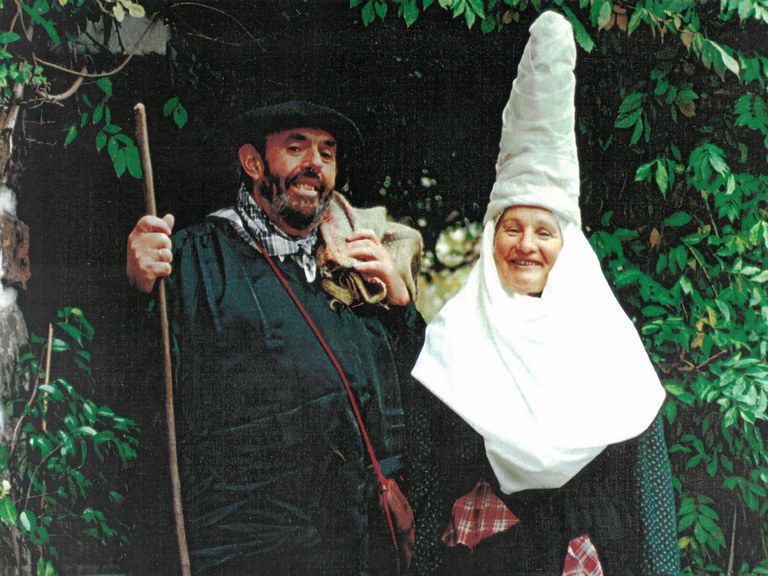Six life testimonies seeking freer sexual and affective relationships
- Polymarriage is a concept that has become popular in recent times. It's not about fucking more and more people, it's about building healthier, more emancipating, more rewarding, more communal interpersonal relationships. Not only among those who share sex and love, but with all people and with the environment in general.

So why limit reporting to “affective-sexual” relationships and not talk about “relations” or “social model” in general? Why not also talk, for example, about asexual love relationships between friends? Surely, it is essential to highlight the lack of sense and subjectivity of these seemingly objective borders, but meanwhile, today and here, with someone we share leather and affectivity, the relationship changes. Also among those who want to take the skin off the mark.
The six people we relate to are not a model of anything, among other things because it is a lack of model, but we have something to learn from their practices, experiences and reflections: that there are other options in plural. All of them have or have had several affective sexual relations at the same time, with the knowledge and consensus of all the people involved. On the basis of this common basis, diversity prevails.
Various practices, built for different reasons and tours Five people have
gathered around the Bureau and five of us have changed the names. Sara, 30, lives with Arkaitz, who for four years both started a relationship with her partner. Just over a year ago he is building a relationship with Maite. Mikel, 37, has been sharing life with Asier for 16 years. They both have sex with other people, including those who have become friends from sex. Stitxu is the youngest in the Quintet, she is 24 years old and the youngest. At the age of 18, her partner started a second relationship. Although at first it became fun, “then came the time when I didn’t have strength and I decided to leave.” Four years ago he established a new relationship that he has maintained with Eguzki, one of his roommates since last year. The Sun is about a quarter full century, it's long had two relationships at once, but it doesn't have a sweet memory, unless it's the one he learned along the way. It is a year in which affective relationships with two people are restored, with greater enjoyment. Jesus is the oldest, has 56 compliments. For almost 20 years he had two loving relationships at once, now he's the only one. Among other things, there have been and there are many other friendly relations that also have to do with sexual intercourse. Elena Scaratti is 47 years old and has not been able to attend the tertulia. Yes, she has asked us to give her a real name, she lives with her husband and her 17-year-old daughter, and she has had several loving relationships at once.
Estitxu: "They tell you, "Take it now to try," as if you had to go back to the monogamous and heterosexual model as you get imposed on yourself."
Jesus has always lived his natural path: “I have never set out how it should be. Until I was 25, I didn't have a serious love relationship. And at first it became very easy for me, because my first mate had had other relationships before. From there I have moved like this.” “On the contrary,” Estitxu replied: “I think I have too much theory. I began to develop affective sexual intercourse when I accepted the mouthful identity. I have always developed relationships with my friends or militant colleagues within a network.” The Sun has explained it in a similar way: “Relationships are developed from an experience of oppression and a shared political project.” It has emerged from what Scaratti felt, but then it has reflected a lot about what it had done. In 2008, she realized that her love for her husband was emotional: “I didn’t want to fool. I told her I wanted her a lot and I didn't want to lose her. But something changed in me and I didn't feel that sexual attraction. I wanted a lot, but I wasn't just happy with her. He understood me wonderfully and decided to transform our relationship.” Sara says she has travelled the way from a mixture between theory and practice, with feminist work as a partner: “I started in a heterosexual relationship, for a while in monogamy. In an instant, I felt a desire or a passion to develop other relationships. I met a mouthpiece. I lay down with him, told the boy and told him I wanted to meet that person, develop an intimacy.” Mikel emphasizes the peculiar gay context: “We have applications and cruising sites, and what you’re looking for here is sex. Sometimes, from these sexual relations we build other relationships: I don't have a partner long ago, but friends or militant colleagues. My couples do the same.”
None of them have a model in their head. “What’s worth to you, and if you can share it with anyone, go ahead,” says Mikel. Jesus very much agrees, “If you ask me about mine, I have no model. I can tell what I've done, not what I want." “It’s easier for me to identify what I don’t want than what I want. I don’t want to form a traditional nuclear family,” says Sara; “That, and not leave life on the way,” Eguzki.
.jpg)
There are issues that have
been agreed precisely and in advance by our partners, others not, or yes, but as specific situations and needs arise.
All diners consider it reasonable to know the affective relationships that are important or profound in the life of each one of them. That does not mean that everything has to be told. Telling other relationships “for me is the basis,” says Eguzki: “My relationships are built from friendship, then, if I tell you what assembly I have tomorrow or with whom I have taken a drink today...” “Counting or not, the border is not so clear,” says Mikel: “We tell ourselves, but if it occurs in a context; we will not share the resume, that was a consensus. Next week we go on vacation and we both know what it's going to, it's over." With one of the two loving relationships, Jesus had agreed to talk about other relationships.
Elena says her is “very spontaneous”. But there is agreement without speaking. “We take care of the family’s space – which she shares with her husband and daughter. Nobody comes in there.” She doesn’t have to tell her husband about her relationships and doesn’t usually do them, but she says she knows many times, or from time to time asks her about the people in those relationships, “because her opinion matters to me.” He doesn't ask. “I don’t care. If he is happy, if he loves me and treats me well, what for?”
Spaces and times go to the colloquium. Jesus has an agreement not to make love with anyone else in the house they share, “if the other is”. Sara lives with Arkaitz. Maite is from another town and when they visit he heads to a house of friends. “At home or where we want,” says Mikel. Sara and Mikel refer to a new consensus in terms of time and ways of being: being together “we are together and to that”. For Sara it is essential to agree and organize the agenda in time, something that is not always easy. Not just to be with Arkaitz and Maite: “I’m clear that I don’t want to focus my life on just those two relationships, I want to be with my friends.”
Consensus should change, create new or disappear depending on the needs of the people involved. Mutual care is always logical. Sara explains that among the three have recently agreed to try to get Arkaitz and Maite to have a date on their part, even if it’s a bit for them to meet. Estitxu has more than a minimum of implicit explicit consensus. The leader of those who have spoken, “Here we go together.” Elena is also based on: “I live relationships in two parallel worlds, but from respect. What I have in one is sacred, also what I have in the other.”
Sara: -It's easier for me to identify what I don't want than what I want. I don't want to form a traditional nuclear family."
An adventure for the immature phase of life?
We ask our interlocutors whether affective sexual intercourse beyond monogamy is only for a lifetime. All diners understand it as a way of being in the world, necessary political and personal and linked to values of transformation.
But sometimes theory and desires is a huge gap for reality. Living in non-monogamy within the rule and monogamous normality is not easy. “For example, if I want to be a mother, how do you do that? How is it managed, who participates? The easiest thing is to reproduce it,” says Sara. Elena's daughter was 6 years old when her husband and she decided to transform the relationship. We have asked her about the daughter's experiences, whether it has brought differential pressure to her or her parents: “We’ve worried, we’ve protected the family nest. But our daughter lives in a loving environment, that's what's important and what's not in many places. You’ll know more or less the kind of relationship we have, you know we’re Frikis, and I think you don’t care what we do outside the house.” It is a personal and collective struggle for those who try it, which can be exhausting and that the ghost of a fear helps in many moments: in case of failure “stay alone for trying to break the general rule”, as Eguzki explains.
Social pressure often acquires a form of contempt and infantilization. “For most of us, ours is like the zoo. ‘You have to have a life,’ says Mikel. Like Jesus: “Every time a colloquium on couples comes out at work, I don’t exist, they don’t ask me anything. I am 56 years old and they call me a Jesuit, as if I were a child.”
For Estitxu, infantilization because it is not limited to monogamy and because it is a lesbian goes along the same lines: “They tell you, ‘take it now to try,’ as if you had to go back to the monogamous and heterosexual model as you get imposed.” The Sun considers that these attitudes have a cause: “Our pure existence distorts the norm. I’ve seen my friends question theirs when I told them about mine.”
Beyond the
difficulties, the joy of life Starting to unravel the joys given to them by these forms of relationship, Elena has emphasized the authenticity: “It’s the greatest happiness. Don’t hide, don’t fool yourself, be with a person you are and let you live.” Estitxu has used another thread: “It’s a very powerful personal process. You learn a lot from yourself.” Sara looks like this cape: “It is an exercise of Christ, I feel that I am not the same person. This feeling is shared by all three. You're somewhere else." A more interesting place, politically transformative. According to Eguzki, “there is no turning back, it is part of my identity and my ways of doing, and even if I went back to exclusivity, the monogamy problem is not monogamy itself, but there is no other option.” Mikel joins her own words to shared thread: “What we do is we do it, it’s because we’ve chosen it, not because ‘touch’. That time has more value. And changes can come at any time, this is a process.” Jesus has pointed out that he has been in a single love relationship for four years, “for that has been the case. Now it seems to me that it will be difficult to build another. But lately I've discovered that Platonic love without sex is possible. It's been a nice discovery, things are moving, life is there."
And if in the circumstances of the conversation we haven't found our doubts, our rational and ideological joys. “Do you enjoy?” In view of the belief that the generalized “yes” has formed a tangle, the last tangle of string has been given by Sara, from the casings and from the heart: “I live happier!” And the complicit and joyful laughter prevailed in the room.
They are not free from the pain and misery of monogamous relationships, they say. Not so much for perverse intentions, but for lack of tools and knowledge.
The risks
of liquid neoliberalism seem to be in conflict with the traditional monogamous model of relationship – sexual exclusivity, the lifelong partner, which constitutes a nuclear family with children – in some spaces as a sign of the extent that the concept of polymericity has had over these years. Is that really the case?
The writer and entrepreneur Brigitte Vasallo (in No. 2632 of La Luz we were told about this topic) is a passionate advocate of other models of revolutionary relations, perhaps more critical of the counterrevolutionary practices that are dominating in the name of polimicity. Neoliberalism denounces a profound work of cooptation and commodification, depoliticizing polymericity and adapting it to its functional characteristics: to chain liquid relationships of consumption and waste, where everything is easy, all hedonism, all Hollywood. It is no more benevolent with some practices seen by Vasallo in left-wing and radical sectors, mainly by the hand of men: transforming the skin of monogamous practices – with more people – maintains the core of the monogamous system – hierarchies and rivalries. In the name of revolution and freedom, increasing pain and neglecting it.
These risks are borne by the interlocutors. “Reading some writings on polymericity, it seems that the machirulus of yesteryear is polymaitist today,” says Jesus, “polimicity can become consumption if there are no clear ideas, confusing itself with polygamy.” Other sexual affective relationships, including theirs, are not free from the pain and misery of monogamous relationships, they say. Not so much for perverse intentions, but for lack of tools and knowledge. Jealousy, fear of staying alone, power relations, lack of care, guilt… are there, among other things. Some may disappear or calm down, others are intensified by overcoming monogamy. It is not a question of ignoring pain, but of how to deal with it in a transformative way that favours its transformation. The conversation would be held without the interlocutors sharing their pains and those who have learned to cope with them. The same is true of this report. That's why we've split the report into two. Read the second part: Pains and dangers behind pruning.
.jpg)
The word friend has many meanings in Basque. It can be a person, a member, a neighbor, a camera, an helper, a couple, a friend. In short, they tell us that he is a travel companion throughout life or at specific times, helping us along the way. Accompaniment, sometimes others do... [+]
Now you hear more about the issue of romantic love, and also, and fortunately, critically. In the end, we have begun to analyze in depth the issue of affective sexual relations, the great expectations we make about what should be and should be a relationship of couple, the... [+]
We present education as indispensable for social transformation. Children and young people who will build the society of the future (transforming the present and the future as if it were not in the hands of adults...) is a way to move away from oppressive thoughts, attitudes and... [+]






















